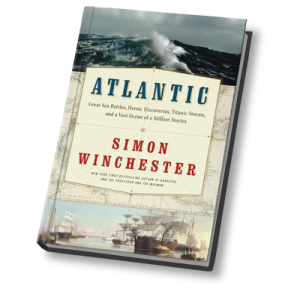Simon Winchester's Blog
December 14, 2013
Possibly the Most Humorous Thing You Will Read All Week
Voice over:
There once was a boy band called SWAGGER who had a couple of hits in the late 80's, were very big in Japan and were once described by MTV as 'the reason why god invented dayglo'. Their debut album 'Batteries Not Included' went double platinum (in Norway) and they lived the high life, hanging out with Hefner at the mansion, opening for Frank Sinatra (Jnr) on his ill-fated 'Old green eyes is back' tour and trading gags with a comatose John Belushi and a bemused Orson Wells on Carson.
They had it all, they wanted for nothing and they were all set to take their career to the next level.
It really couldn't go wrong.
Until it did.
On the eve of releasing their much-awaited second album, 'Metrosexual' they disbanded suddenly after some serious 'musical differences'. The exact circumstances are now the stuff of myth but are thought to have involved a drum machine, Carole King, Perry Como and a jumbo-sized bucket of chicken wings.
Whatever it was that really happened we will never know but what we DO know is that at 4am one Thursday in June the three of them left the studios in Nashville in four limos - one heading North, one South, one East and one West.
And then they vanished.....
Maybe they were dead.
Maybe they were in rehab.
Or maybe they were just biding their time.
Over the years rumours abounded about their real whereabouts -
Simon W had apparently been variously spotted swimming the Atlantic, singing in the chorus line of the ill-fated musical adaptation of the Oxford English Dictionary and working in a gentle men's outfitters in Rhyll.
Martin R had been spotted working as a Max Headroom tribute act on the Northern Club circuit, selling truffles from the back of a camper van in downtown Vegas and as a gladioli wrangler for Dame Edna.
And Simon T had disappeared completely after his attempt to be the first man to single-handedly climb Anna Nicole Smith (without the use of oxygen) ended in public shame and the complete loss of all of his body hair.
Now thirty years later they have been tempted out of retirement by 'public demand' because one of their songs has been used in a straight-to-DVD episode of Glee.
The two Simons hate Martin because he still has all his own hair (and some of theirs) and Martin hates the two Simons because they have all the royalties.
But after an ice-breaking lunch at River Cafe they agreed to be photographed together for the first time....
Coming soon to a venue near you in 2014.
Contact: Suzanne Gluck at WME for availability for weddings, funerals, barmitzvas and circumcisions.
November 26, 2013
This week only: “The Man with the Electrified Brain” free on Byliner
Read my story "The Man with the Electrified Brain" all week long as part of Byliner's ThanksReading celebration:
October 19, 2013
NPR’s Weekend Edition
September 22, 2013
Tedxeast Talk: “How Technology United the States”
My new Tedxeast talk on "How Technology United the States." Click to learn about the eccentrics that helped make America exceptional.
October 2, 2012
The Man with the Electrified Brain
My new ebook, available on  as a Kindle Single (only $1.99) and also available on Byliner.
as a Kindle Single (only $1.99) and also available on Byliner.
November 27, 2011
Ceilidh
In honor of the 42nd birthday (on 28th November) of my son Angus, who is a mixologist extraordinaire, I was going to ruminate on the origins of the word whisky, derived from either the Scots Gaelic usquebaugh or the rather lovelier Irish ditto uisgebeatha. But a combination of linguistic ill-discipline and serendipity led me otherwise, to the reminder that the winter dancing season has now begun back home in Scotland, and that all over the nation, from Lerwick to Berwick, from Dunnet Head to Gretna Green, Scots will be enjoying the delights of the ceilidh (pronounced caylee), and which originally signified
an evening visit, a friendly social call.
Today, and for the past hundred years or so, the word has come to mean
a session of traditional music, storytelling, or dancing
all of which is these days often augmented (and often greatly improved by being so) with ample quantities of usquebaugh. Such gatherings are a lot of fun: most birthdays, bar-mitzvahs and even the coming holidays tend to pale beside a full-blown Highland ceilidh, though their hangovers are seldom so memorable.
November 1, 2011
Simon’s ATLANTIC now in paperback

Atlantic: Great Sea Battles, Heroic Discoveries, Titanic Storms,and a Vast Ocean of a Million Stories was published in hardback by HarperCollins, London, October 11th 2010, and by HarperCollins, New York, November 2nd 2011. Paperback editions came out in London in July 2011 and in the US on 5th November 2011.
The book was delivered to the publisher on January 14. Now comes the long process of editing, designing, the choosing of illustrations and maps and the design of the jacket - all of which I will endeavor to tell you about as the weeks ago by.



Here are some Audio Postcards sent to PRI's The World
Simon Winchester's Atlantic WorldSeal colony on Namibia's Skeleton Coast
April 6th, 2009Simon Winchester's latest postcard reached us from a perilous stretch of coastline in southern Africa. Cold offshore ocean currents produce dense fog, and a harsh and steady wind drives the surf. That makes going ashore here next to impossible Over the centuries, more than a thousand ships have tried, only to end up smashed on the rocks.
South Georgia mountains
March 12th, 2009In March Simon Winchester sent an audio postcard from the Sub-Antarctic island of South Georgia, where he follows in the footsteps of explorer Ernest Shackleton in 1916. Shackleton's ship, The Endurance, had sunk, and with two of his crew, Shackleton rowed and sailed for three weeks in a small open boat, and then walked across the glaciers to the whaling station on South Georgia. His first sight of the station, when he knew that at last he and his men would be safe, was a momentous occasion, and Simon Winchester tells us more from the very spot where Shackleton first saw the station:March 5th, 2009Anchor Lisa Mullins speaks with Simon Winchester about the Falkland Islands. Winchester visited the British territory 27 years after the United Kingdom and Argentina fought a war over these islands in the South Atlantic. He reflects on the what life is like on this remote Atlantic outpost then (1982) and now.
March 2nd, 2009
This time Winchester sends us an audio postcard from an island that inspired Shakespeare.February 2nd, 2009The Purple Islands (or Iles Purpuraires) played a big role in the history of the Atlantic Ocean dating back as far as the ancient Phoenician civilization. Simon Winchester explains all in an audio postcard that's postmarked the Purple Islands:
October 27, 2011
October 6, 2011
Jobs
As a modest lexical tribute to Steve Jobs, I thought it might be useful to remind ourselves of the origin of his surname-word - defined only in its singular form, of course - by noting that it is a word possessed of connotations considerably less stellar and uplifting than those attached to the astonishingly gifted co-founder of Apple Computer.
As it happens the first sense of Job in English also stems from a surname. The Biblically-recorded patriarch of the land named Uz was named Iobe, and as the story has it, he was man revered for enduring poverty and privation. So legendary was his stoicism, indeed, that his name - which since the 13th century has been given an affricative, and rendered as Job - has come to stand for a figure with endless patience and fortitude.
More commonly - though lexicographically a little more puzzling - the word job , without a capital initial, has also come to mean
A piece of work; esp. a small and discrete piece of work done as part of one's regular occupation or profession.
The first use of this sense is recorded in 1557. There is a continuing debate, however. It ranges around whether this word - of unknown origin, it has to be confessed - first strictly meant just a piece of work, or whether it meant a piece of the results of work. For there is sense, dating from three years later, 1560, where jobbe (as it was then spelled) came to be used to designate
A cartload; the amount that a horse and cart can bring at one time
Scholars are still searching for which of these senses (and there are many more) truly came first. It is part of the great joy of the lexicographic art that so many still feel compelled to track down just what a well-known English word really meant, at the moment it was first gathered into our language.
That small controversy aside, one thing is for sure, however: in the nicest possible sense, Steve Jobs himself was indeed a piece of work, unique and unforgettable. Appositely named, maybe, though with a hint of an enduring enigma about him also.
August 30, 2011
Froward
This is a word much-disdained by spell-checking software - most brands insist the 'ro' should be an 'or'. But in just the same way that we bravely overrule the direction-Nazi inside the car GPS, so we should on occasion ignore the spell-checker. Most especially here, since froward is an ancient (14th century), respectable and rather beautiful-sounding word (it is pronounced with its first syllable rhyming with row, as in an argument). Moreover, its meaning renders it more than a little useful: it signifies
disposed to go counter to what is demanded or what is reasonable; perverse, difficult to deal with, hard to please; refractory, ungovernable; also in the wider sense, bad, evilly-disposed, "naughty".
We've had violent and dreadful weather in the American north-east this past few days, as Hurricane Irene has swept through ungovernably, from the Carolinas to Vermont. It would be entirely proper to describe our weather as froward, much as Lord Russell was once described as "froward, arrogant and mutinous." Nasty, bad, ill-disposed - Lords and hurricanes, all of a piece.
Simon Winchester's Blog
- Simon Winchester's profile
- 2240 followers





